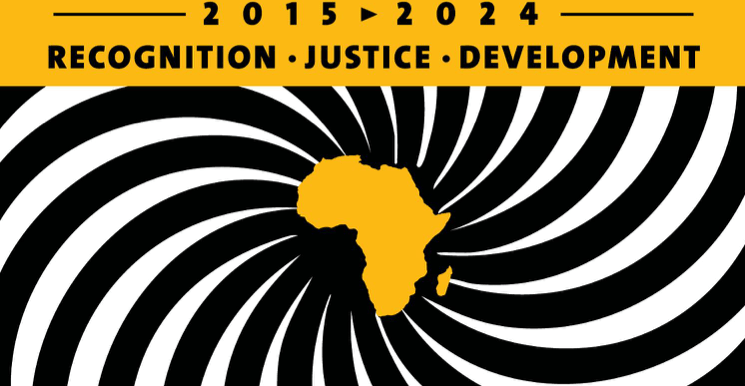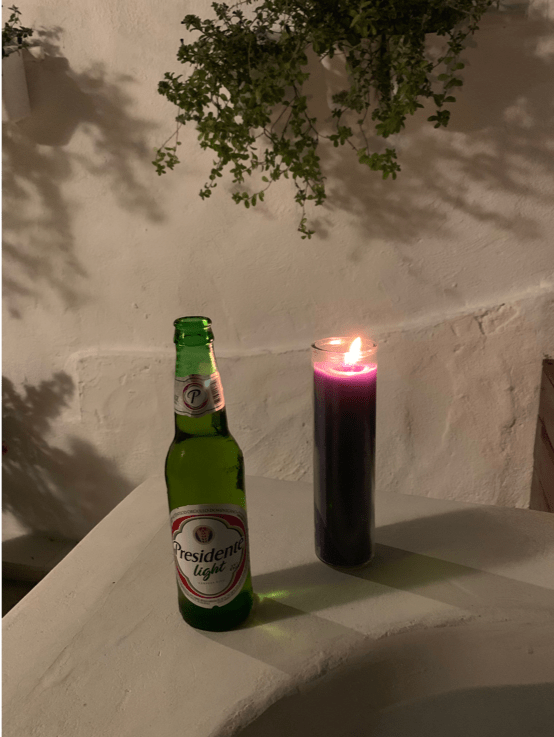
About the Author
Adrián Emmanuel Hernández-Acosta is a Ph.D. candidate in Harvard’s Committee on the Study of Religion and a graduate student associate at DRCLAS. His dissertation focuses on representations of African diaspora religions in Hispanophone Caribbean literature and film, particularly in scenes of death and mourning. He can be reached at emh834@mail.harvard.edu.
International Decade for People of African Descent
It’s February 2020. For some, this augurs the beginning of the end of a highly contentious presidential election, whether in the United States, the Dominican Republic, or elsewhere. For others, it brings forth new threats albeit from familiar foes, such as earthquakes in the Caribbean basin that have once again shaken an already precarious Puerto Rico. For me, this year also marks the halfway point in the United Nations General Assembly resolution 68/237, which declares the years 2015-2024 as the “International Decade for People of African Descent.” Halfway through and bearing witness to the death by drowning of African migrants in the Mediterranean Sea on route to Europe. Halfway through and bearing witness to the assassinations of black activists in Brazil and Colombia—Marielle Franco, to name one of many. Halfway through and bearing witness to the rise of Black Lives Matter with its many local leaders dying as they attempt to move to, as Trinidadian poet M. NourbeSe Philip puts it, “defend the dead” and those who are left mourning in their wake.
The theme for the “International Decade,” as proclaimed by the UN General Assembly, is “People of African descent: recognition, justice, development.” And according to official reports, various countries purport to have taken concrete measures in three spheres to which the theme refers: political recognition, legal justice, and economic development. It is difficult at best to report a measure of historical progress on any of these fronts when the experience of people of African descent is one of historical recurrence that is punctuated by untimely death time and time again. Surely, it was an appreciation of history, the global history set against those of African descent, that led to the declaration in the first place. The two-page UN General Assembly resolution reveals as much. Six of the resolution’s 12 paragraphs begin with the words, “Recalling,” “Reiterating,” “Acknowledging,” “Taking note with appreciation.” And yet, how do we address, let alone redress, the ongoing history that has resulted in the need for a resolution like this in the first place? How do we best tell that history so that we remain vigilant against the institutional mechanisms for political recognition, legal justice, and economic development that at times work to the very detriment of those of African descent? How do we make sense of the call to an affirmation of black life in the “International Decade” when history continues to leave so many dead in its wake?
These questions about history, this problematic that history presents, is not new to black studies across the Americas. Arturo Alfonso Schomburg’s 1925 essay, “The Negro Digs Up His Past,” and the last chapter in W.E.B. DuBois’s Black Reconstruction in America (1935), “The Propaganda of History,” immediately come to mind. In recent years, however, the centrality of history as a problematic has become all the more apparent in black studies. From heated debates over the periodization of racial slavery and emancipation, to an insistence on the particular regional contexts that distinguish Afro-Latin American experiences, to recent reexaminations of the purported success of Latin American democracies to overcome racial differences—history as a problematic in black studies today clarifies for us that the meaning of history has never ridden on the wings of the owl of Minerva. The meaning of history stays tossed amid the gusts of wind created by the gathering of a thousand owls in the dead of a seemingly endless night.
In various religious traditions, the owl is not only a figure of wisdom, but also of death. In the Mayan text Popol Vuh, owls are the messengers of Xibalba, the underworld. In Haitian Vodún, the owl is “dried foot” Marinette, the one who offered pig sacrifice on the eve of the Haitian Revolution. Even the English language provides us with some poetic insight by nestling the owl not only in “knowledge,” but also in “acknowledgment.” In the religious traditions I study, African diaspora religions, the beginning of wisdom is not the fear of God—as the biblical book of Proverbs would have it—but acknowledgment, acknowledgment of the dead. I have come to learn this lesson countless times in my work. But my most recent research trip to the Dominican Republic stands out in a very personal way.
During a six-hour conversation with an anthropologist of Dominican Vudú, I asked her how she had gotten involved in the study and practice of this religious tradition. She replied, “Well, a close friend of mine—may he rest in peace—invited me once to the cemetery. And I said, ‘To the cemetery?!” And he said, ‘Yeah, to the cemetery.’ Ask me how long I’ve been there since he first brought me…I still haven’t left.” As if her response alone had not been enough to dwell on, the context in which she gave her response intensified its force. That morning, we had received news that the author I was going to interview had unexpectedly passed away at some point the night before from unforeseen complications with an unknown illness allegedly contracted while in Haiti. She too had known this author personally. During our time together on the rooftop of her second-floor apartment, the anthropologist and I ended up eulogizing the author, bonding over our shared connection with her. We went on to discuss scholars who had long passed but whose influence has lingered in the academy to this day. We even gossiped about those we considered not to have honored the memory of the dead. We worked our way through documents and photographs. At times, we politely muffled our laughter and at times we quietly restrained our tears. At times, we kept silence together—her barking dogs notwithstanding.
The dead make and remake our sense of space, of time, and of ourselves in ways we cannot always control and for which we do not always have words. It behooves us to acknowledge them, for their sake and for ours. If nothing else, it is our affective attachments to them that disrupt any linear understanding of history. For people of African descent, the experience of history has not been simply a progressive march from a woeful past into a better future. How that experience might be told otherwise remains to be written.
Writing in the month of February, I want to reflect on how the history of Black History Month itself shows that the death and mourning of black lives continues to interrupt the celebration of black life and with it any strident view of history. When historian Carter G. Woodson chose the second week in February for “Negro History Week,” it was because it coincided with the birth anniversaries of Abraham Lincoln (February 12th) and Frederick Douglass (February 13th). And yet, by the time President Gerald Ford nationally recognized it in 1976, Black History Month had become as much the occasion for a celebration of life as for the remembrance of the dead, such as Medgar Evans, Marsha P. Johnson, Martin Luther King Jr., Dana Martin, Erica Garner, Fred Hampton, Jesús Galíndez Suárez, and Malcolm X, among many others.
And now, as the 55th anniversary of Malcolm X’s assassination approaches (February 21st, 1965), I remember the calls for justice he was making on behalf of people of African descent the world over. In the last year of his life, he petitioned the United Nations Commission on Human Rights to consider the case of the then 22 million African Americans in the United States as a violation of international human rights rather than as a domestic civil rights issue. He had not been the first to appeal to the UN on behalf of those of African descent. His contemporary, the Congolese prime minister Patrice Lumumba had asked UN forces to secure the newly independent nation from separatist factions that along with foreign investment interests had a different future for the country in mind—a future that looked awfully similar to its colonial past. The appeals made by both Patrice Lumumba and Malcolm X met a dead end in the court of the international community. Both their lives were also cut short.
How, then, do we reckon with this problematic of history, which refuses any easy narrative when it comes to the experience of people of African descent? How do we best tell history when death accumulates not only, as black studies scholar Christina Sharpe notes, in the form of “the ditto ditto in the archives,” but also in the experience of historical repetition? How does one redress the dead? Caring for the lives of people of African descent demands that these questions be posed.
More Student Views
Puerto Rico’s Act 60: More Than Economics, a Human Rights Issue
For my senior research analysis project, I chose to examine Puerto Rico’s Act 60 policy. To gain a personal perspective on its impact, I interviewed Nyia Chusan, a Puerto Rican graduate student at Virginia Commonwealth University, who shared her experiences of how gentrification has changed her island:
Beyond Presence: Building Kichwa Community at Harvard
I recently had the pleasure of reuniting with Américo Mendoza-Mori, current assistant professor at St Olaf’s College, at my current institution and alma mater, the University of Wisconsin-Madison. Professor Mendoza-Mori, who was invited to Madison by the university’s Latin American, Caribbean, and Iberian Studies Program, shared how Indigenous languages and knowledges can reshape the ways universities teach, research and engage with communities, both local and abroad.
Of Salamanders and Spirits
I probably could’ve chosen a better day to visit the CIIDIR-IPN for the first time. It was the last week of September and the city had come to a full stop. Citizens barricaded the streets with tarps and plastic chairs, and protest banners covered the walls of the Edificio de Gobierno del Estado de Oaxaca, all demanding fair wages for the state’s educators. It was my first (but certainly not my last) encounter with the fierce political activism that Oaxaca is known for.







